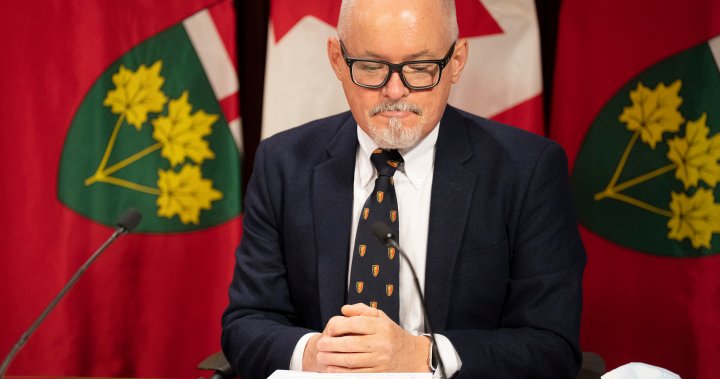Ontario’s top doctor says measles cases in the province remain stable and largely isolated to a few specific cultural communities, but concedes convincing those groups to get vaccinated is “slow going.”
Since October, Ontario has recorded more than 1,400 new measles cases, linked to an outbreak that began at a large gathering with guests from Mennonite communities in New Brunswick last fall.
The province recorded 197 new active cases over the past week, its outbreak continuing weeks after neighbouring Quebec was able to declare its outbreak over.
Those numbers have led to growing criticism of the Ford government’s response and calls for the province to do more. Opposition parties have demanded a more visible public health campaign and vaccination drive.
While the numbers remain higher than they have been historically, Ontario’s chief medical officer of health, Dr. Kieran Moore, said he remains confident they are under control.
“I still think it’s stabilizing,” he said. “We’re roughly seeing, in terms of active cases in Ontario, 100 to 150 new cases every week. It is the most infectious agent known to humans and normally spreads from one unvaccinated person to roughly 16 — so we’re not seeing that explosive, exponential growth.”
The province’s outbreak is particularly affecting some Mennonite, Amish and other Anabaptist communities, which have lower vaccination rates. Moore said that, while the numbers in those communities were high, he’s not seen evidence of wider community spread.
Around 70 per cent of the province’s cases are in southwestern Ontario, he said, and most of the other cases can be traced directly back to a social connection with those original cases. Another 15 to 20 cases relate to travel, Moore said, and 20 in total are still being traced.
Get weekly health news
Receive the latest medical news and health information delivered to you every Sunday.
“We figure it out and connect the social dots. Some people don’t want to be interviewed, some people won’t respond to our questions,” he said. “Ontarians maintain that wall of immunity, and it has not been able to spread to any significant extent to the general population.”
Earlier in the week, Ontario Premier Doug Ford lamented the low vaccination rate in some places — and said the government was spending $2 million on a public health information campaign.
“There’s certain communities in Ontario, for religious reasons, aren’t getting their kids vaccinated,” he said. “How do you force someone? Do you grab their kid and start jabbing them with a needle? It’s a problem.”
Ontario Liberal MPP Adil Shamji criticized the government’s approach and said rolling out a social media campaign on measles was an ineffective way to reach those who need to get vaccinated.
“I have a feeling that the Instagram ad campaign the government has launched by tossing a couple of bucks behind it, probably won’t work for the Mennonite community,” he said, “but going to their faith leaders and engaging them in the conversation and having one-on-one talks locally is the way to go.”
Moore said the plan described by Shamji was already taking place in southwestern Ontario.
He said the “ground game” included translating literature into low German — spoken by the Mennonite community — and appearing on low German radio shows and in low German press.
Resistance, however, has remained.
“I think it’s very slow going, but it is one-on-one relationships with a family physician, with a nurse, with the frontline workers in the hospital system,” he said. “And these are really important conversations that they’re having, but this is generational, historic, that these communities have not taken advantage of immunization.”
Moore said he believed the extent of the spread within parts of the Mennonite community in southwestern Ontario was due to the rise in measles cases around the world.
“This is a result of the global increase,” he said. “I personally didn’t realize that this community does travel significantly and has widespread community connections and, as a result of the increase in global risk of measles, they were vulnerable from the start to this rise globally.”
The province’s top doctor said he hoped to see the number of cases decline as summer approached, but conceded he wasn’t surprised by how the outbreak had played out in the province.
“In an unvaccinated community, this is sadly how measles does behave,” he said.
“It’s very aggressive, it’s persistent, it will find unvaccinated individuals in those communities and it will naturally peak this time of year and settle in the summer.”
— With files from The Canadian Press
© 2025 Global News, a division of Corus Entertainment Inc.

